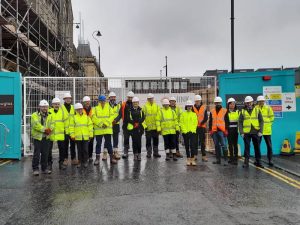Working in the construction and built environment sector is a way for young people to directly influence and change the world around them. The industry is fast-paced, exciting and progressing at great speed, but is quite often overlooked as a viable career option. Attracting more young people into the industry and igniting their passion in architecture, infrastructure and emerging technologies, is critical to stand any chance of reducing the widening skills gap.
With commentary from some of the talented young people working in BAM, Kier and Wates, in this blog Procure Partnerships Faye Dolan takes a look at why, despite the current impact and restrictions associated with COVID-19, the construction industry needs young people more than ever.
Real-Life Experience: Patrick Wilson, Apprentice Estimator, Kier
“As a Trainee Estimator my role includes working in the pre-construction team to support the commercial side of a tender. Day to day, my tasks can vary from reviewing drawings, creating measures, and speaking to sub-contractors.
I left sixth form and became a Trainee Joiner/ Labourer, but with a love of maths it was my aim to find a role that was a balance between accountancy and working on-site, which lead me to look at estimating and quantity surveying. Before I came to Kier, I didn’t even know what an Estimator was! I think it would be really useful for the professional roles in construction to be promoted more in schools and colleges.
Kier has given me the opportunity to study in order to gain qualifications. I am about to enter my second year at Salford City College studying Level 3 Construction in the Built Environment as well as my Level 3 NVQ in Constructions Contracting Operations. Once finished, I hope to move onto the next step of my development and enter the Kier Degree programme. Through my apprenticeship, I am able to pursue a career in estimating, an opportunity I would never have thought about before joining Kier. I also receive lots of support, from senior management and the Directors at the company. They provide me with opportunities to further my construction knowledge through courses such as Asbestos Awareness, whilst also challenging me and helping me put what I’ve learned to good use. This is great and opens more paths for me in the future with the business.”
Investing in Young People Post-Covid
In late June 2020, Boris Johnson announced the governments post COVID-19 economic growth strategy, stating that for the UK to ‘bounce back stronger’, we must “…build, build, build. Build back better, build back greener, build back faster.”
To achieve this, the industry cannot afford to take its foot off the gas in addressing the skills gap and attracting new recruits. We are living in a world in which almost everything had been altered by Covid-19; pre-covid, the industry was desperately searching for new talent, trying to spark our youths passion in construction through careers fairs, work experience placements, STEM learning activity days and site visits for schools. Whilst the world has changed and many companies may temporarily pause these events, we must be wary of the long-term implications of totally abandoning these engagement and educational activities.
Lara da Rocha Faria, CSR Manager at Kier Regional Building, is concerned about the knock-on implications that COVID-19 will have on the young people currently working in the industry and on those who are looking to enter:
“Young people have been amongst the hardest hit by the pandemic and are up to three times more likely to work in areas where their jobs are at greatest risk. The TUC report that young females are under the greatest risk of all and are up to six times more likely to lose their jobs. There are many questions that will be concerning young people at present, such as if their apprenticeship will continue in September, will their grades really be worth the same as others in the jobs market, or will they be able to access any work experience placements.”
In order to build the resilience needed to ensure that the industry is able to bounce back, Lara believes that we must continue to invest in young people:
“One thing that COVID -19 has taught us all is the importance of the digital and virtual world and the skills required to navigate it. This is where young people come into their own. As businesses learn to operate virtually, we can offer virtual careers fairs, virtual work experience placements and virtual interviews for jobs, to ensure these opportunities still remain. Running these events virtually may actually benefit the industry, because we are able to reach a wider and more diverse talent pool.”
Real-Life Experience: Joe Massey, Level 3 Apprenticeship in Building Services, BAM
“Construction and engineering have always been subjects that have appealed to me from an early age, with influences from family members in the trade. After discovering that A-levels were not the route I wanted to pursue, I researched and found there was a modern apprenticeship available via BAM Construct.
Initially gaining a qualification in Building Services, then latterly specialising in my preferred sector of Electrical Engineering, this route has enabled me to apply the knowledge on site that I have gained on electrical services whilst on day-release at college. I have been able to work on high-profile and prestigious projects, including the TATA Technologies HQ building in Leamington-Spa and the largest speculative office building outside London at Three Snowhill in Birmingham. I have now completed my Level 4 training and will be moving on to my degree level apprenticeship, I am able to study whilst continuing to gain valuable experience working on projects across the Midlands, including on a 26 storey commercial office building at 103 Colmore Row.”
Overcoming an Outdated Image to Increase Diversity
Attracting more people into the industry will be especially important as we move forward to deliver ambitious government targets in areas such as renewable energy and affordable housing. The Construction Youth Trust reports that 22% of the workforce are over 50, and 15% are in their 60s. Recent political issues including Brexit, have only exacerbated the issue, and we are now faced with the implications of the COVID-19 pandemic, leaving many concerned that, without a fresh approach to recruitment, we simply won’t have the workforce available to deliver this workload.
We must change the outdated perceptions of the industry; for some, construction work conjures up images of hard manual labour, freezing winters spent outside, and dirty site facilities. Many young people have a limited understanding of what a career in construction may actually look like, or of the various career paths the industry could take them on.
Typically, young people may assume that the sector is predominantly about manual roles, such as bricklaying or plumbing. The many essential professional roles for which creative, mathematical or scientific thinking are essential, such as an architect, designer or engineer, may not automatically spring to mind.
Another challenge the industry must address is the under representation of various minority groups. In order to successfully design and construct buildings and infrastructure which meet the needs of society as a whole, we desperately need to attract a diverse range of people to the industry.
Nikunj Upadhyay, Head of Diversity & Inclusion at Wates believes we must find new ways to spread the message that a career in construction is suitable for everyone:
“Construction is a great place for a young person to build a career. The sector offers opportunity to explore different career pathways and can be appealing to any young person looking for a varied and opportunity filled career. However, we as an industry are not reaching as many young people as we need to, particularly young women and people of colour. We need to intensify our reach and offer different ways young people can engage with the sector- work placement, internship, apprenticeship or any newer innovative models that work for younger people.”
Providing the opportunity for young people from a wide range of backgrounds to connect with relatable role models, whether that be via work experience placements, careers days or industry taster sessions, will help to remove any existing preconceptions and stereotypes and provide a modern image of the inclusive and diverse industry. There is huge capacity for social mobility within the construction sector and it is important that young people know that project managers, architects, quantity surveyors, brick layers and engineers come from all walks of life and backgrounds.
The Future is Digital
The skills gap that we are facing provides a huge opportunity for young people to engage and access the industry, and to quickly progress. We are on the cusp of huge technological change and the requirement to modernise and digitalise the construction process to allow proper integration and collaboration provides huge opportunities for a generation of digital-savvy millennials.
James Bravington, Business Development Manager at BAM, sees opportunities to access and develop innovative technologies as a key way to attract more young people to the industry:
“It is important for BAM and the industry as a whole to continue to attract young people into the industry and make sure that a career in construction is satisfying and fulfilling. We need to continue to show that a career in the industry is full of variety and is exciting and enjoyable. At BAM this is most definitely the case, we are at the forefront of the most advanced construction techniques and leading the way in digital construction. Through the introduction of digital construction platforms, such as BIM 360 Field, and our mentoring scheme, all our trainees and apprentices are equipped with access to the latest technology. We nurture their progress throughout the apprenticeship, with experienced Senior Building Services Managers and Senior Site Managers providing regular structured feedback and reviews.”
To successfully attract more young people and accurately portray what a career in construction can offer, it is important we draw on the technologies available to make ourselves heard. Young people have access to world at their fingertips, and so using platforms such as YouTube and social media as a way to spark interest is essential.
Organisation such as Inspiring Construction, an industry campaign led by Build UK and the CITB, and Construction Youth Trust, are paving the way in helping the industry to shake off its past image, but it is only by working collectively and pooling our resources into education and training, that the industry will be able to recruit the right workers to hit its targets.
Real-Life Experience: Lewis Hough, Buyer, Wates Construction Ltd
“I am a Material Buyer for Wates Construction in the North West team. My role involves procuring building materials for all housing developments and commercial construction sites.
What I particularly love is the fast-paced environment and working on many different packages at the same time. My daily tasks include raising material purchase orders, scheduling deliveries with the construction site team, take offs, cost negotiation, resolving credit control issues and material cost control / reconciliation. Procurement is very challenging, and I enjoy that there’s a new problem to solve every day.
I have progressed from a site administrator, to procurement assistant, to buyer in the short space of 6 years – an achievement I am incredibly proud of. Despite leaving school with no qualifications, I was determined to learn as much about construction, in an official capacity, as possible. In 2014, I decided to start a part time degree in Construction Project Management at Salford University, balancing my studies with my full time role at Wates. In 2019, I graduated with a First-Class Honors Degree. The practical skills I learnt on the job were excellent in helping me complete my degree, while the academic and management skills I have learnt through my studies have been incredibly useful when applied to my role at Wates. One example is Lean Organisation management, which centres on making the most of your time. I implement both practical and academic skills into my daily routine. My achievements were recognised recently when I won G4C North West Young Professional Of the year, something I am immensely proud of.
I believe that as an industry, we need to make Construction more inviting for young people leaving school through work placed apprentices, work experience, workshops etc., and it is the role of those already working in the industry to champion it to others, as an exciting and challenging place to work. I recently carried out a workshop for 35 school students at Saddleworth School, where I was a student. In the session, we made gingerbread houses to engage the students, and I related the process in terms of methods of construction while explaining the many routes to gaining a job in the industry. I think it is vitally important to encourage young people into the industry and I am keen to support in any way I can.
In five year’s time I envision myself working in a procurement or supply chain role but also as a direct line manager so I can pass on my knowledge and experience to others. I have already had a taster of managing our team’s procurement assistant and have really enjoyed supporting others.”

Faye Dolan, an esteemed professional and Framework Director at Procure Partnerships, boasts a rich and diverse career spanning seven years in the construction industry. Faye’s journey within Procure Partnerships began in 2018 as a Key Account Manager, initially overseeing the North West region and later extending her purview to the entire North.



